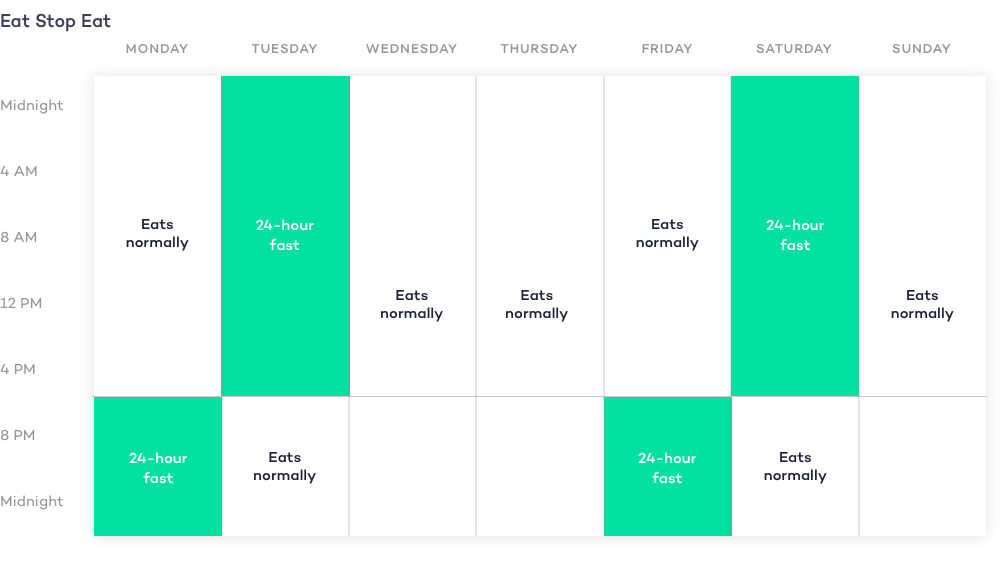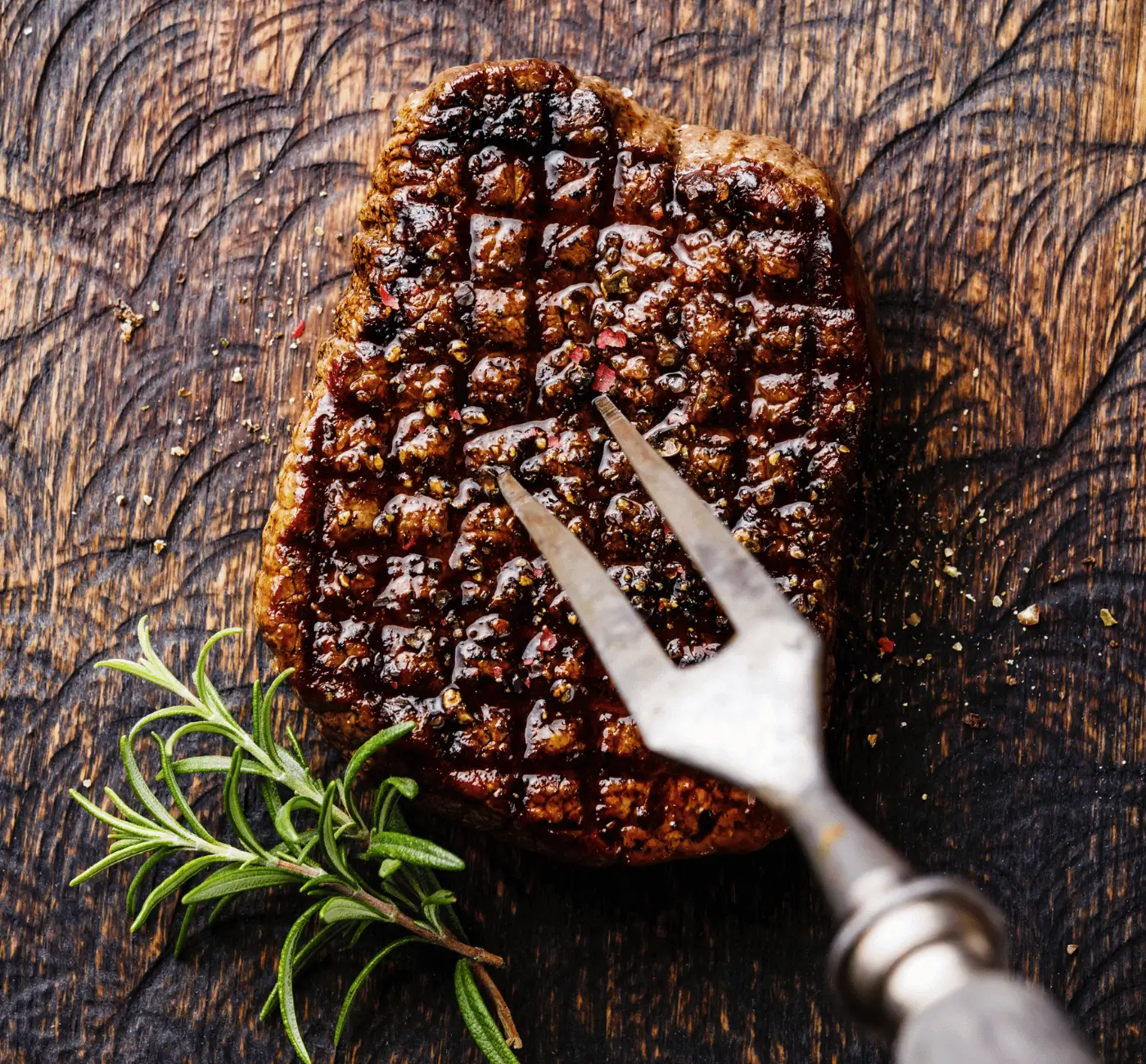
The eat stop eat diet is one of the most popular intermittent fasting schedules. Proponents of fasting say it makes being healthy simple. With IF your health and wellness isn’t dependent on pricey supplements or complicated biohacks — it’s about what you don’t do, at least intermittently.
In this article, we’ll cover everything you need to know about Eat Stop Eat, including how it’s done, how it works, and who it’s for.
The Eat Stop Eat Diet is a simple form of intermittent fasting that entails fasting for two days every week. Ideally they should be spaced out and not consecutive.
Eat Stop Eat was created by nutritional researcher Brad Pilon, who introduced this new way of eating in a book by the same name.
Pilon got the idea for Eat Stop Eat based on the fasting research he’d done at Canada’s University of Guelph. To this day, Brad insists that Eat Stop Eat isn’t just a diet; according to him, it’s a lifestyle shift that acknowledges the importance of meal timing. [1]

As we said earlier, the Eat Stop Eat Diet has relatively simple specifications. It’s as simple as abstaining from food for two seperate 24-hour periods. During the other five days of the week, you simply eat freely.
Brad Pilon’s original protocol was pretty flexible when it came to the foods to eat during intermittent fasting.
However, we recommend fueling your body with the most nutrient rich foods like fatty fish and seafood, red meat, and healthy fats and full-fat dairy like cheese, yogurt, and cottage cheese. Low carb veggies, and low carb fruits are also acceptable, but should be supplemental to avoid plant toxins and antinutrients.
Though these 24-hour fasts can be placed at any point throughout the day (or night), most people prefer to do them this way:
As you might have noticed from the above, fasting for a 24-hour period doesn’t actually mean you go a full day without eating. It just means you’ll only eat one meal during your fasting days.
Some proponents of the Eat Stop Eat Diet make it a little easier by allowing for low-calorie beverages during the fasting period. If you wish to go down this route, coffee with liberal cream or butter is a good choice. Be sure to drink plenty of water during your fast, too.

Intermittent fasting techniques like Eat Stop Eat Diet have been correlated with a variety of health benefits. Here are some of the highlights:
Multiple studies show that fasting may reduce blood pressure levels to a healthy range. Part of this effect could be caused by fasting’s ability to boost BDNF-1, an important hormone that helps regulate blood pressure. [2]
Other studies show that fasting may reduce ‘bad’ cholesterol levels. [3] And if the Eat Stop Eat Diet causes you to lose weight — which it probably will — blood pressure may normalize further. All in all these changes are a recipe for radically improved cardiovascular health.
Fasting may help control your blood sugar. One study of over a thousand type II diabetics showed that a month of intermittent fasting was enough to lower and stabilize blood sugar.
It’s widely known that fasting forces the body into fat-burning mode known as ketosis. This helps you kick your carb addiction, and eating less carbs means more stable blood sugar levels. [4]
Fasting may also increase your body’s insulin sensitivity, allowing your body to better metabolize carbohydrates when you do eat them, then to switch back to burning fat for fuel when carbs are restricted during fasting. [5]
Other studies affirm that a variety of different fasting methods all work to regulate blood sugar and improve insulin sensitivity. [6]
Numerous animal studies show that fasting may increase lifespan. In animals, at least, fasting delays the degenerative conditions associated with aging, leading to greater longevity. These effects are seen in bats, rodents, fruit flies, and worms. [7]
It’s thought that fasting gets its anti-aging power from a process called autophagy, which occurs when your body’s immune system recycles damaged cells and swaps them out for new ones. [8] The effects of autophagy may be broadly protective against cancer, diabetes, arthritis, and neurodegeneration.
That being said, studies haven’t yet confirmed that fasting increases lifespan in our species. There are also confounding factors: most animals in the control groups (non-fasting groups) of these fasting studies eat the equivalent of junk food. Therefore, what these studies might be highlighting isn’t the benefits of fasting — but merely the benefits of not eating toxic sugary junk.
This last benefit may come as a surprise, but it’s true nonetheless: humans have been using fasting to escape the realm of materialistic distraction and get closer to the divine for thousands of years.
“We read in ancient history that fasting has been practiced since time immemorial by the religious people of the East and by most ancient civilizations,” Patricia Bragg explains in her book, The Miracle of Fasting. “They practiced fasting not only for the recovery of health and preservation of youth but [also] for spiritual illumination […].”
Bragg goes on to explain the role 40-day fasts played in many ancient initiation rites. Jesus fasted for forty days in the wilderness prior to receiving the Holy Spirit. The Greek philosopher Pythagoras required all his disciples to fast for 40 days before they could be invited into his spiritual teachings. [9]
The early Church saint Tertullian felt the same way — he was once quoted as saying that “fasting possesses great power […] if practiced with the right intention, it makes one a friend of God.” [10]
While the entire Muslim world practices a version of intermittent fasting every day for the entire holy month of Ramadan.
While the Eat Stop Eat Diet has been shown to be safe and effective for most adults, it has several potential pitfalls worth keeping in mind.
People with a fast metabolic rate may be unable to meet all their nutritional needs on Eat Stop Eat.
These so-called “fast metabolizers” may become deficient in B vitamins, fat-soluble vitamins, and even in calories if they fast too frequently. These deficiencies can cause a vicious cycle of appetite loss that makes it even harder to get enough nutrients in.
The good news is they’re easily overcome. All you need to do is base your diet on nutrient-rich animal-based foods like fatty meats and especially organ meats which can provide many hundreds of times your RDV in B vitamins with only small servings, or from convenient organ meat supplements.
While the Eat Stop Eat Diet usually improves blood sugar regulation, that’s not the case 100% of the time. People with preexisting diabetes (or the quick metabolisms mentioned above) may have a hard time going 24 hours without food without having their blood sugar drop too low. [11]
For people with advanced diabetes, going that long without food can cause a dangerous drop in blood sugar. Be sure to talk to your doctor prior to fasting if you have a condition like this. [12]
Extended periods of fasting can cause serious hormonal changes — some beneficial, some potentially negative. On the plus side, it can boost human growth hormone levels enough to improve muscle mass and reduce water retention.
However, fasting can throw off some of the very same hormones that are most important to women. Extended fasting may reduce a woman’s natural fertility and raise stress hormones. [13]
Eat Stop Eat isn’t recommended for women who are nursing, pregnant or trying to become pregnant. Stick with less intense fasting strategies specifically for women.

The Eat Stop Eat Diet doesn’t get that specific with its dietary requirements — and that means that there’s room for improvment. Here are some ideas to help you make Eat Stop Eat even better.
Combining intermittent fasting with keto can enhance the benefits of both dietary approaches.. This combo will allow you to stay in fat-burning mode 24/7. You can’t go wrong if you focus on keto superfoods like steak, eggs, bone broth, and healthy keto snacks,
Recent research has shown that supplementing with exogenous ketones can make fasting’s effects even more beneficial. [14]
You don’t even have to purchase a fancy ketone supplement to do this. Coconut oil is rich enough in MCTs to boost your body’s ketone production. You can cook with it, bake with it, or even melt it into your morning coffee.
You might have heard that exercising on an empty stomach is bad for you. Thankfully, however, we humans practically evolved to exercise while fasting. Partaking in low-impact exercises can catalyze fat-burning and reshape your body. It can also help you get into ketosis faster. Try doing some swimming, walking, cycling, yoga or any other enjoyable activity.
Organ meats present a great way to avoid developing nutrient deficiencies on your Eat Stop Eat Diet. If you don’t like preparing and eating regular organ meats, we’ve developed a solid alternative: Dr. Kiltz’s premium beef organ supplements.
These supplements are packed with pro-metabolic B vitamins and highly absorbable heme iron. [15] These nutrients can keep your metabolism running on all cylinders during your 24-hour fasts.
Thousands of people from across the world have experienced tremendous results from the Eat Stop Eat diet.
But Eat Stop Eat isn’t some sort of universal cure. Some are better suited for Stop Eat shorter fasts like the popular 16:8 fasting schedule. These groups include:
As mentioned above, intermittent fasting can have negative effects womans’ hormonal profile. [16]
Some women experience hormonal imbalances, mood swings, irritability, or irregular periods if they fast too frequently. If you wish to play it safe, you can always just stick with three animal-based meals per day. Read our IF for women article if you’d like to learn more.
“Instead of medicine, better [to] fast today.” – Plutarch
The Eat Stop Eat diet provides modern eaters with a simple way to fast like their ancestors. The diet offers quite a selection of benefits without many downsides:

.png)
We’re a global community of seekers, healers, and doers committed to reclaiming health on our own terms. When you join the Kiltz Mighty Tribe (KMT), you’ll gain access to education, support, and collective wisdom.


